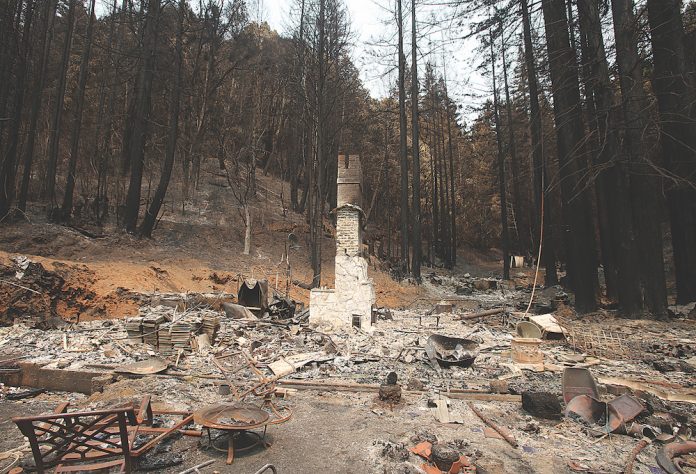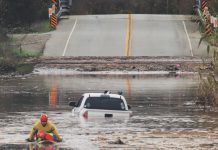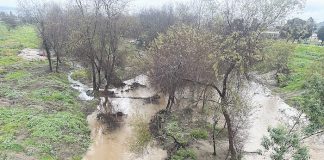
SANTA CRUZ COUNTY—One week after firefighters contained the CZU Lightning Complex Fire, which scorched 86,509 acres and destroyed 1,565 structures in the Santa Cruz Mountains, county officials had a dire prediction for the coming winter months.
Heavy rainfall unable to soak into the fire-damaged soil will instead flow downhill, taking rocks and trees with it in mudslides and so-called debris flows. These can reach speeds of 30 mph and destroy the homes and other structures that lie below.
Residents of the burned mountainous region—many of whom recently returned to their homes after being evacuated during the fires—should therefore prepare themselves anew for evacuation.
The Watershed Emergency Response Team—typically formed after wildfires by Cal Fire and the California Geologic Survey—is expecting a high probability of debris flows this year.
Department of Public Works senior planner Carolyn Burke told the Santa Cruz County Supervisors during a special meeting Tuesday that the destructive CZU Complex makes the prediction even grimmer.
“Even if your home has been safe for the past 30 or 50 years, we are now grappling with a post-fire burn scenario that we have not seen in decades or longer,” she said. “The threat is real, and it is worse now than ever.”
The only way to be safe, Burke added, is to evacuate before the debris flow starts by closely monitoring weather conditions.
“Once you can see or hear a debris flow, it’s too late,” she said.
It is unclear how much rain the county will get this year.
According to meteorologist Ryan Walbrun, the area is set to get a weak to moderate La Niña, which could bring “near normal” precipitation. That can mean heavy rainfall at times.
“Everyone should expect it and plan for it,” he said. “If we get through the season without it, that would be amazing, but that’s not likely.”
Burke said the CZU Complex left behind steep burned slopes and debris-filled channels, and that the waxy residue left behind in the soil makes water run off of it.
The resulting debris flows can extend as much as a mile beyond the burn zone, she said. Worse, it is difficult to predict where they will occur, and they cannot be ridden out, fought or escaped, she said.
“Their unpredictable nature and powerful force make it imperative that we act swiftly to save lives by educating our community on the risk of debris flows, and the only effective means of protection, early warning and evacuation,” she said.
Even 15 minutes of high-intensity rain, she said, can cause a debris flow.
County geologists are currently mapping debris flow hazards and identifying structures that are at risk.
After the 2018 Thomas Fire in Santa Barbara County, residents of Montecito had less than 24 hours to evacuate for a debris flow that occurred just before 4am and destroyed 425 structures in 15 minutes and killed 23 people, Burke said.
The flow also buried Highway 101 for 12 days in mud that was described as quicksand-like, she said.
County experts reached out to Santa Barbara County officials, who said that a strong public communication system is essential to prevent similar losses of life, said Assistant Director of Public Works Kent Edler.
“They strongly stress that we need to get the message out that debris flows need to be taken as seriously as a wildfire,” he said. “We want to stress that it’s not about the amount of rain in 24 hours, it’s more about the intensity over a short period of time.”
Advice from Santa Cruz County officials:
- Residents living in the burn zone, or on the slopes below it, should be prepared to evacuate at all times during the rainy winter months.
- Residents should not reoccupy their homes without clearance from a licensed professional geologist.
- Pay attention to weather forecasts, and use an alert app such as Code Red.
- During a storm that could trigger a debris flow, stay awake and alert and heed evacuation orders.












